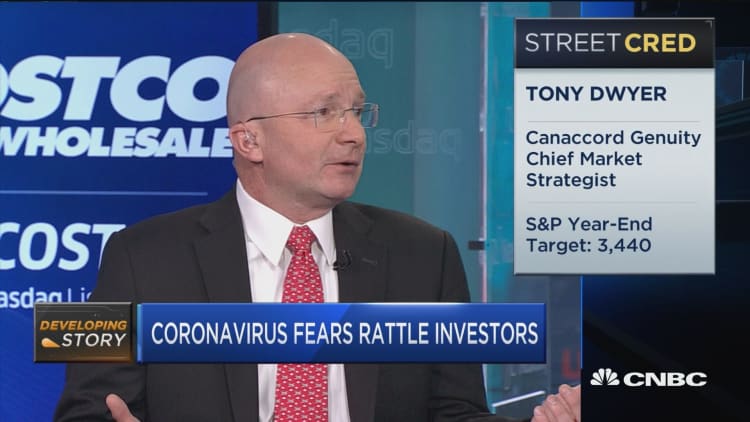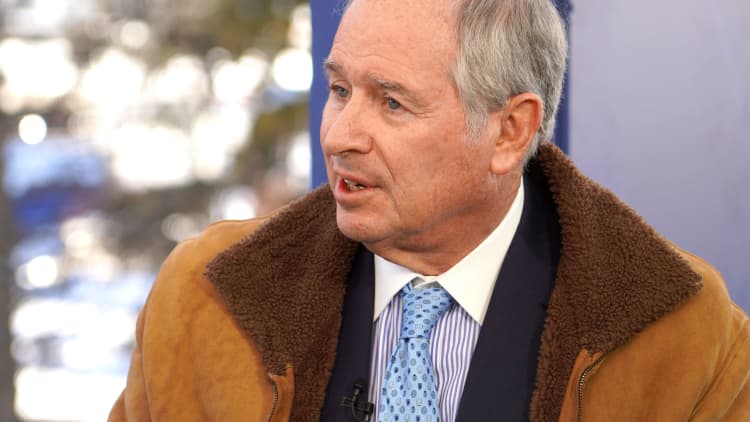
Stocks pulled back from record levels on Tuesday after the Centers for Disease Control told Reuters that a traveler from China was diagnosed with the first U.S. case of coronavirus in Seattle.
The Dow Jones Industrial Average fell 152.06 points, or 0.5% to 29,196.04 and dropped as much as 201.63 points. The S&P 500 slid 0.3% to 3,320.79 while the Nasdaq Composite dipped 0.2% to 9,370.81. The Dow snapped a five-day winning streak while the S&P 500 and Nasdaq posted their first loss in four sessions.
Shares of casino and hotel companies Wynn Resorts and Las Vegas Sands fell more than 6% and 5%, respectively, amid fears that the coronavirus outbreak in China would dent international travel.
Airline stocks hit their lows of the day following the news. United Airlines and Delta Air Lines both declined more than 2.5%. Shares of Southwest and American Airlines were down 2.7% and 4.2%, respectively.
Boeing shares added to the downturn, falling more than 3% on news the company doesn't expect regulators to sign off on the beleaguered jet, the 737 Max, until June or July. The shares were briefly halted.
Sentiment across global markets had taken a hit overnight amid concerns about the virus.

The outbreak of the new coronavirus in China has killed four people with confirmed cases exceeding 200 ahead of the Lunar New Year holiday, during which hundreds of millions of people are expected to travel. Late on Monday, Chinese authorities confirmed that the virus is contagious.
The new crisis reminded traders of the economic fallout from the deadly Severe Acute Respiratory Syndrome (SARS) crisis in 2003.
Asian equity markets tumbled overnight. The Shanghai Composite dropped 1.4% while the Hang Seng index slid 2.8%. In Japan, the Nikkei 225 index fell 0.9%. Korea's Kospi index also pulled back 1%.
Tuesday's declines paused the market's record-setting run. The Dow was headed for its first decline in six sessions while the S&P 500 was set to snap a three-day winning streak. U.S. markets were closed Monday due to the Martin Luther King Jr. holiday.
Still, the market has already carried momentum in 2020 from a strong performance in 2019. The S&P 500 surged more than 28% last year, its biggest annual gain since 2013. This year, it is up around 3%.
"We are just again in this craziest monetary and fiscal mix in history. It's so explosive. It defies imagination," hedge fund billionaire Paul Tudor Jones, founder of Tudor Investments, told CNBC's "Squawk Box" at the World Economic Forum in Davos, Switzerland. He added investors should not sell immediately, noting the Nasdaq doubled from a similar stage to the top of the dotcom bubble. "That's a long way from now. At the top theoretically, rates [would] be substantially higher."
Sentiment on Tuesday also soured slightly after Treasury Secretary Steven Mnuchin told The Wall Street Journal that a phase two trade deal between China and the U.S. may not remove all existing tariffs. "We may do 2A and some of the tariffs come off. We can do this sequentially along the way," he said.
President Donald Trump also told the Journal he is "absolutely serious" about imposing tariffs on European cars if a trade deal with the region cannot be struck.
Meanwhile, the International Monetary Fund (IMF) on Monday downgraded its global economic growth forecast from 3.4% to 3.3% for 2020. The U.S. economy is projected to grow by 2.0% this year, a downward revision of 0.1 percentage points compared with the IMF's October 2019 forecast.
But John Augustine, chief investment officer at Huntington Private Bank, thinks this market can yield further returns for investors.
"We think stocks could run for a while, absent some event," Augustine said. "We're starting to see signs of confirmation elsewhere. It's not just the Nasdaq and the big tech names."
The corporate earnings season continued after the bell with Netflix releasing its latest quarterly figuers. So far, the reporting period is off to a good start. More than 70% of the S&P 500 companies that have posted better-than-expected quarterly earnings, FactSet data shows.
—CNBC's Elliot Smith, Maggie Fitzgerald and Yun Li contributed to this report.



